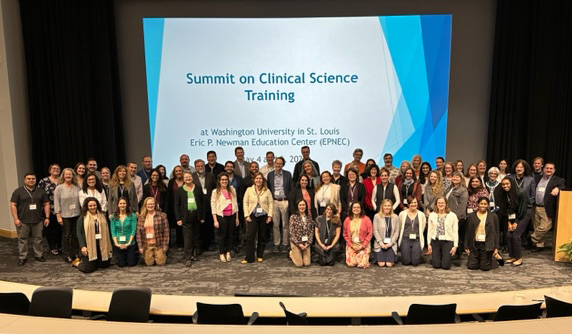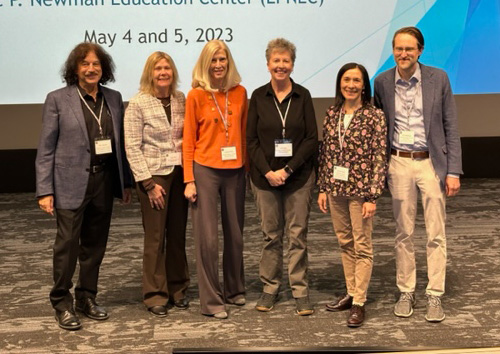Exploring the Future of Clinical Science Training

Image above: Attendees of the 2023 Summit on Clinical Science Training.
Have we moved the needle in reducing the burden of mental illness? That was one of the opening questions posed at the Clinical Science Summit, held May 4 and 5 at the Eric P. Newman Education Center at Washington University in St. Louis. The Summit’s purpose was to bring together representatives of the many stakeholders in clinical science (CS), including faculty, students, supervisors, internship directors, employers, funding agencies, and national organizations, to consider the current state of CS training and how we can strengthen and improve it for the next generation of clinical scientists in order to better address pressing public health needs.
The Summit was sponsored by the Academy of Psychological Clinical Science (APCS), the Psychological Clinical Science Accreditation System (PCSAS), the APA Board of Educational Affairs and Education Directorate, the Council of University Directors of Clinical Psychology (CUDCP), several universities and departments of psychology, and the Brown University Clinical Psychology Training Consortium. APS sponsored my attendance so that I could provide a summary for the broader membership.
Universities and Psychology Department Summit Sponsors
Washington University in St. Louis; Florida International University; Indiana University; Kansas University; Northwestern University; Stony Brook University; The Ohio State University; The University of Arizona; the University of California, Los Angeles; the University of Southern California; and the University of Rochester.
The Summit was organized into four themed sessions related to CS training: equity and justice, evidence-based training, integration in training, and the future. The sessions featured a brief talk followed by small workgroups that each tackled an issue related to the session theme. Guided toward generating solutions and not simply listing problems, the workgroups were fantastically generative with respect to ideas, actions, and next steps. Videos and summaries of the Summit talks and workgroups can be found on the APSC website.
In opening, former APS President Robert Levenson raised the challenges and opportunities facing clinical science, including the importance of disseminating what we know, developing and improving our treatments, addressing systemic racism, improving our evidence-based training, and broadening our efforts toward other societal problems, such as gun violence. These challenges and opportunities were echoed throughout the summit.
Identifying DEI gaps
The session addressing equity and justice emphasized the importance of including diverse groups in clinical science, yet noted our tendency to keep diversity, equity, inclusion, and justice (DEIJ) siloed rather than central. Joanne Davila, the PCSAS board president and a professor at Stony Brook, along with graduate student Jaisal Merchant (Washington University in St. Louis) and Stacy Frazier (Florida International University) also noted that despite efforts over the past several decades, CS programs are falling short in meeting shared DEIJ goals and ideals. Their presentation challenged CS programs to change admissions practices to expand dissemination and implementation of our science and treatments and to use the lens of DEIJ to identify gaps in CS training and the knowledge base.
Workgroups after the session addressed critical topics including equitably evaluating and selecting applicants; promoting health and well-being for CS students, faculty, and staff; strengthening the accountability of CS training in meeting public health needs; and training from a DEI perspective.
Facilitating evidence-based training
In exploring the theme of evidence-based CS training, Jennifer Callahan, a professor at the University of North Texas, raised three action items for CS programs. First, she noted that although we have a solid foundation of evidence-based clinical assessment and intervention, we have not yet generated a strong science of CS training. She argued that we need to innovate in this training to make it truly evidence based, collecting data as we go and working collaboratively across programs. Second, she emphasized that the time between when evidence-based training practices are disseminated to others and actually implemented in training programs is too long: on average, it is 17 years. To lessen this gap, she suggested that CS programs create a collaborative, living document that describes emerging evidence for training practices and the resources needed to adopt them in other programs right away so that additional research can be conducted on these emerging practices.

Finally, Callahan noted that some geographic areas (e.g., rural) and groups of people (e.g., marginalized groups) do not have the same access to mental healthcare as others because there are too few psychologists who can provide it. To address these workforce disparities, she suggested that CS programs add a website section describing areas where psychologists are needed and then ask applicants to CS programs to describe their Interest and experience to work to fill those needs. Since most students in CS programs ultimately go on to careers in practice, CS programs will have admitted students who have a passion and interest to address workforce needs.
Workgroups following this session covered enhancing and promoting evidence-based CS training; balancing generalized and specialized training; components of a general CS curriculum; and evaluating whether CS training is effective.
Breaking down silos
Teresa Treat, a professor at the University of Iowa and a member of the PCSAS Review Committee, presented on the theme of integration in CS training. Training ought not to be siloed into research, clinical, and DEIJ components, she argued, but rather these should be merged and influence each other. This will allow programs to produce graduates who can develop and disseminate science-based, accessible, and adaptable health services to a diverse population. Achieving this level of integration in clinical science training will require collecting and evaluating data to assess success and promote accountability.
Listen to Teresa Treat’s recent interview on the Current Directions in Psychological Science podcast with the author of an article called Everybody Hurts: Intersecting and Colliding Epidemics and the Need for Integrated Behavioral Treatment of Chronic Pain and Substance Use. Listen to all APS podcasts.
Workgroups in this session included discussions of facilitating good mentorship; integrating application training within research-focused departments; maintaining and strengthening implementation and dissemination; and maintaining and strengthening the science of clinical supervision.
Building toward the future
In addressing the final theme—the future of CS training—Keanan Joyner, an assistant professor at the University of California, Berkeley discussed four considerations. First, he argued, the future is interdisciplinary. Most trainees in CS programs will not end up in academic settings or even private practices, therefore we need to prepare students for careers in other settings and develop methods for accommodating different training goals under the umbrella of clinical science. Second, he made the case for changing how we think about and conduct clinical training. For example, instead of counting practicum hours as an index of success, we need to ensure that students meet competency minimums. He also noted that the U.S. future demography will be drastically more diverse, yet systemic structures in clinical science are not ready for this reality. Studies have demonstrated that diversity is great for science, and we need to actively build this into our training programs.
Read all of the articles from the September/October Observer.
The workgroups from this session tackled building collaborations across CS programs; building flexibility into internship programs; and training for CS careers outside of academia.
To conclude the Summit, APCS president Thomas Rodebaugh (then at Washington University in St. Louis, now at the University of North Carolina at Chapel Hill) highlighted recurrent and emerging ideas and topics discussed, including the need for CS training programs and internships to communicate with each other more frequently and to pool data across programs. The field needs data that are not snapshots in time, he said, but systematically gathered longitudinal data. Relatedly, he argued that not all programs have to do everything; those with similar training approaches can band together for data collection and evaluation. Finally, on the topic of competency assessments, he noted that programs can work collectively to, for instance, develop common measures and metrics. Rodebaugh encouraged attendees to write down two ideas or changes they would bring back to their work from the Summit.
Rodebaugh delivered a report on the Summit at the 2023 APS Annual Convention in Washington, D.C.
Among the common themes to emerge from the workgroups were
- the importance of gathering data on learning outcomes, such as admissions, the effectiveness of our training models, and curricula for increasing dissemination and implementation; and of creating data dashboards for evaluating success;
- sharing resources across programs in areas such as recruitment, training, and DEIJ;
- increasing humility about what we do not know in areas such as DEIJ, internship models, and dissemination;
- developing and implementing better measures in our training programs to assess effectiveness;
- communicating across programs with ideas on how to achieve training goals without simply piling on more requirements for students;
- creating partnerships with other disciplines to enhance our training and better meet public health needs; and
- recognizing that our training needs to be flexible enough to prepare students to meet future needs.
Overall, I found the Summit inspiring, motivating, illuminating, and generative. Its two days were filled with enthusiasm and energy for making meaningful changes in CS training, particularly with respect to the importance of dissemination, DEIJ, accountability, and integration. Participants seemed eager to identify next steps that will sustain the Summit’s momentum. Indeed, in a final group session, the most commonly raised comment was, “What can we do next?”
APCS is already planning for a follow-up virtual Summit, and the many attendees who agreed to continue their workgroup discussions led me to believe that the future of CS training is moving in a positive direction.
Feedback on this article? Email [email protected] or login to comment. Interested in writing for us? Read our contributor guidelines.





APS regularly opens certain online articles for discussion on our website. Effective February 2021, you must be a logged-in APS member to post comments. By posting a comment, you agree to our Community Guidelines and the display of your profile information, including your name and affiliation. Any opinions, findings, conclusions, or recommendations present in article comments are those of the writers and do not necessarily reflect the views of APS or the article’s author. For more information, please see our Community Guidelines.
Please login with your APS account to comment.